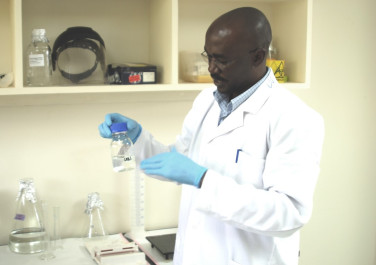Through its competitive research grants the African Union has awarded a research grant worth over US$ 1.2m to the College of Natural Sciences (CoNAS) of Makerere University to implement a three-year research project to be carried out by a consortium of scientists, aimed at curbing the African Swine Fever.
Makerere’ University’s Associate Professor Charles Masembe from the Department of Zoology, Entomology and Fisheries Sciences is the Principal Investigator, and the Project dubbed ‘Developing innovative and sustainable approaches to prevent the spread of African Swine Fever (ASF) in Africa (ASF-RESIST)’ will be implemented in Uganda, Nigeria, and the United Kingdom.
CoNAS at Makerere University will partner with the MRC – University of Glasgow Centre for Virus Research (Scotland, UK); the National Veterinary Research Institute (Nigeria); Biosciences eastern and central Africa – BecA-ILRI Hub (Kenya); National Veterinary Institute, (Sweden), and the Regional Universities Forum for Capacity Building in Agriculture (RUFORUM).
The project was developed at a write-shop facilitated by RUFORUM under the auspices of the Platform for African-European Partnerships for Agricultural Research and Development (PAEPARD), and will determine the phenotypic and genotypic features of pigs that survive ASF outbreaks, develop a community-based participatory biosecurity approach to control ASF outbreaks and evaluate ASF rapid diagnostics for use in resource constrained settings and also determine the full genome characteristics of circulating ASF strains.
African Swine Fever is a highly contagious hemorrhagic disease that is a major constraint to pig production and the pork industry in many countries in sub-Saharan Africa, periodically killing 90–100% of affected animals, and has neither treatment nor vaccine.
The disease is characterized by high fever, loss of appetite, haemorrhages in the skin and internal organs causing death in 2-10 days on average. Scientists say it a real threat to an industry that has become very attractive as a means of food, income and employment. Pigs constitute one of the small stocks that are considered “walking banks” in the local communities.
Smallholder pig keeping is a good opportunity for the predominantly rural African population to raise money quickly. Pigs grow to maturity in a short time (8-12 months) and are raised successfully on food waste and other inexpensive fodder. They can be sold with relative ease, including at markets in urban areas.
The project is focused on unlocking the ASF challenge among smallholder pig farmers and enhance productivity. Efforts will be made to leverage on collaborative support from on-going efforts in the pig value chain including the community action research project at Gulu University supported by RUFORUM as well as undertakings by the International Livestock Research Institute (ILRI).








